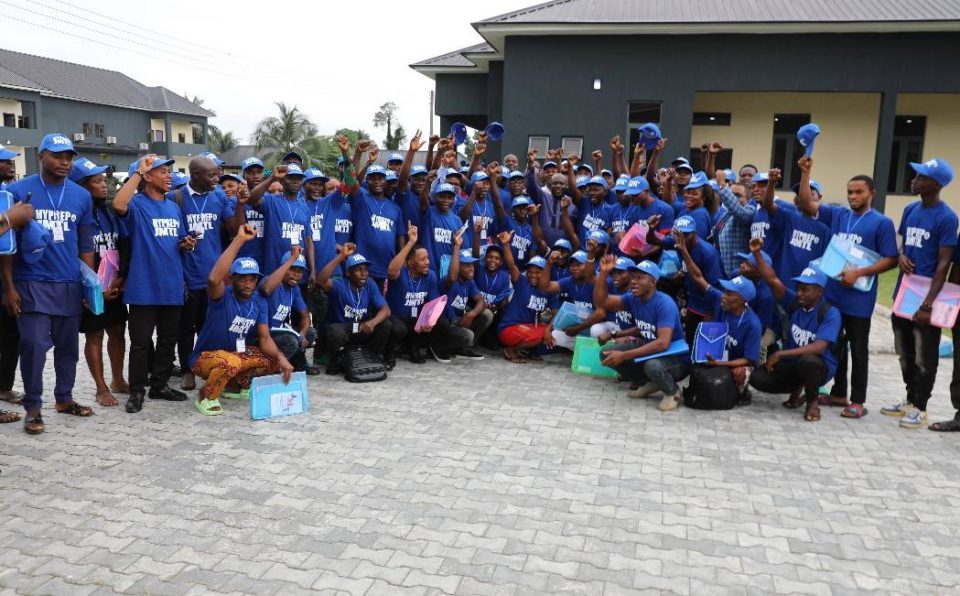By: Felix Ikpotor
The Hydrocarbon Pollution Remediation Project, HYPREP, has trained no fewer than 2000 community workers on shoreline protection, environmental remediation and mangrove restoration in Ogoniland.
The community workers will assist the over 34 contractors already engaged by HYPREP to work on shoreline protection in the area.
The beneficiaries were trained on International Maritime Organisation, IMO , Certification 1&2 and will be deployed to work on the over 460 hectares of mangroves in the area, the agency said.
Project Coordinator of HYPREP, Prof Nenibarini Zabbey while addressing the trainees at Kpor community in Gokana local council of Rivers State, said that the training is meant to equip them with the required skills for the clean up exercise.
He said the training is part of HYPREP’s livelihood programmes for people of the area as the skills acquired would be beneficial to them beyond Ogoniland and even after the project has ended in the area.
He emphasized that the cleanup activities in Ogoniland is going in accordance with international best practices.
“The clean up we are doing in Ogoni is people centred, it’s inclusive and following international best practice. For you to qualify to work in a wet land, in the creeks, in the shoreline, you need International Maritime Organisation,IMO, Certification 1&2 and that’s what this training is all about.
“So I want to urged you to take the training very seriously, you have to participate actively in every bit of this training from the classroom to the components in the field, of course it’s hands on training and by the time you finish this training stage and you are deployed to the field to support our 34 shoreline contractors, then you will further deepen your understanding of how shoreline clean up is done and you will further deepen your experience so that when you combine the experience you have acquired and the certificate that you would be awarded, it will prepare you for not just our clean up but for the clean up of this entire country,” he said.
Prof Zabbey added: “As you are doing this training, another training is going on concurrently at Bomu and when we are done with your batch, another batch will come on board for this same training so that overall, we are going to train over 2000 community workers that will support the clean up and what that means is that you are now given the tools to be able to clean up polluted environment.
the Project Coordinator stated that the agency was training 5000 youths in 20 different skill areas to empower them to earn their livelihood and become productive.
He said HYPREP’S project in communities in Ogoni would further empower the people and give them better source of livelihood.
“We have projects site scattered all over Ogoni like the Ogoni Environment and Restoration Centre, that project alone would empower 800 Ogoni youths, as we speak, over 300 Ogoni youths are currently working there and ofcourse, the Ogoni Specialist Hospital is also there and your colleagues are also working there. Now when we put all these together including those that are working at our 39 remediation sites as well as the 40 water projects sites, so a critical mass of the youths and women of Ogoni are involved in our clean up activities and that’s promoting sustainable livelihood,” he stated.
Earlier at a stakeholders meeting in Bomu, Prof Zabbey said there was need to get the community people to buy into what the agency is doing as they are the primary beneficiaries.
“We have decided to come and have an interaction with critical stakeholders within the mangrove value chain which includes those who fish and harvest mangrove as source of energy, so we have gathered this critical stakeholders from the seven shoreline communities in Gokana to consult them, to know their area of interest in our mangrove restoration project so that we take those expectations and build them into our planning, definition of objectives so that those expectations will guide us in measuring the outcomes, the success of our mangrove restoration projects.
“We are doing this because when we are done with the restoration, it will take many years to monitor the return on ecosystem goods and services by the mangrove we have planted, so it’s the community people that will join us to plant the mangroves, join us in monitoring the performance of the mangroves even when we have left Ogoni,” he said.
One of the facilitators of the training, Mr Jonah Shekwolo said the training which has a duration of four days is expected to give participants the needed qualification to work on the shorelines.
He said the training is internationally acceptable, the course content is standard and with qualified facilitators.
He expressed the hope that at the end of the training, participants would be able to operate equipments and know the strategies in environmental remediation and safety measures.

